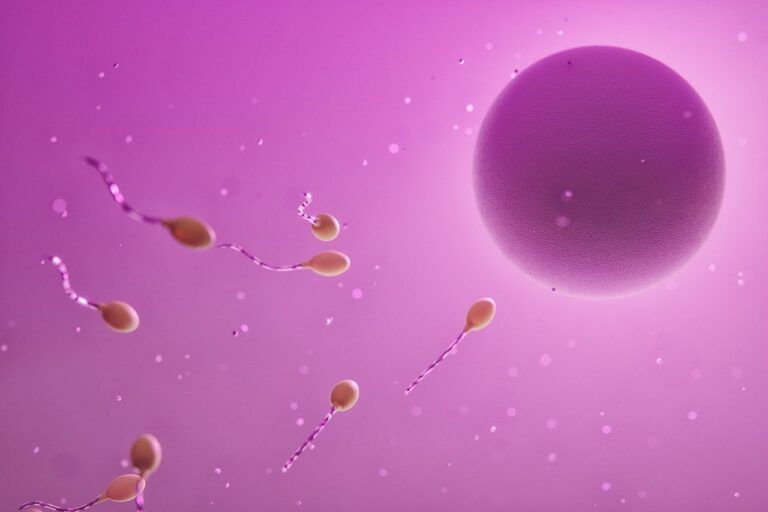Most of my fertility patients will have heard me mention sperm DNA fragmentation and its possible involvement in unexplained infertility. But it’s not generally well known, and even I hadn’t heard much about it until a few years ago. As such, it is often overlooked when fertility assessments are offered and could be therefor be a possible cause of unexplained infertility.
Sperm DNA fragmentation refers to the presence of breaks or damage in the DNA strands within sperm cells. This can have significant adverse effects on conception and embryo health. Unfortunately, the NHS and some consultants will not test for this as a cause of unexplained infertility. Here’s how testing may help with your fertility.
How Sperm DNA Fragmentation Can Prevent Conception
Firstly, let’s look at the damage DNA fragmentation of sperm do to conception.
High levels of sperm DNA fragmentation are associated with lower fertilisation rates. Sperm with fragmented DNA are less capable of successfully fertilising an egg, which can reduce the chances of conception both naturally and through assisted reproductive technologies (ART) like IVF and ICSI.
Sperm with fragmented DNA often have compromised motility and vitality. This can hinder their ability to reach and penetrate the egg, further reducing the likelihood of successful fertilisation.
The Impact of Sperm DNA Fragmentation on an Embryo
If we are lucky and the damaged sperm manage to fertilise an egg, what further damage can it do to the embryo it created?
Embryos formed from sperm with high DNA fragmentation often exhibit poor quality. This can manifest as slower development, abnormal morphology, and reduced viability. Poor-quality embryos are less likely to implant successfully and develop into healthy pregnancies.
High levels of sperm DNA fragmentation are strongly linked to higher miscarriage rates. Embryos with fragmented DNA may have genetic abnormalities that prevent them from developing properly, leading to pregnancy loss.
Embryos formed from sperm with high DNA fragmentation might experience arrested development, where they fail to progress beyond certain stages, such as the blastocyst stage. This can lead to failed IVF cycles and lower overall success rates of ART.
While less commonly studied, there is some evidence suggesting that high levels of sperm DNA fragmentation can impact the long-term health of offspring. Potential issues include developmental delays and an increased risk of certain genetic disorders.
Who should be tested for Sperm DNA Fragmentation (SDF)?
The European Society of Human Reproduction and Embryology (ESHRE) and World Health Organisation (WHO) guidelines recognise the value of SDF testing in certain clinical conditions. They suggest that SDF testing can provide additional information in cases of unexplained infertility, recurrent miscarriages, and previous ART failures.
This should also include men with advanced age, suboptimal semen parameters, varicoceles and couples with poor blastocyte development and arrested embryo development.
Unfortunately, the NHS and many fertility and IVF clinics do not include it as a recommended test.
What Are the Causes of Sperm DNA Fragmentation?
Factors such as smoking, work or environmental pollutants, certain medications and infections can increase oxidative stress. High levels of reactive oxygen species (ROS) in the reproductive system can cause damage to sperm DNA. As men age, there is an increased likelihood of DNA damage in sperm cells, including fragmentation. This may be due to the accumulation of oxidative damage over time.
The presence of a varicocele, which is the enlargement of veins within the scrotum, can lead to increased testicular temperature and oxidative stress. This is associated with higher levels of sperm DNA fragmentation.
Poor diet, stress, excessive alcohol consumption, smoking, vaping, drug use, obesity can contribute to sperm DNA fragmentation.
The testes should be a couple of degrees cooler than the body and increased heat to the area can cause sperm impairment. This can be caused by tight underwear, saunas, bike riding, mobile phones or laptops in the front pocket or on the knee.
It is also worth noting that a previous mumps infection or trauma to the area due to surgery or physical trauma will affect sperm health.
Can You Repair DNA Fragmentation?
There is some good news.
In some cases, it is possible to repair DNA fragmentation, but it basically depends on the cause. If the damage is due to oxidative stress, then adopting a healthy lifestyle can help reduce oxidative stress and improve sperm quality. This includes maintaining a balanced diet, regular exercise, avoiding tobacco and excessive alcohol consumption, and managing stress levels.
In addition, taking antioxidant supplementation such as vitamins C and E, selenium, zinc, and coenzyme Q10 have been shown to have beneficial effects in reducing DNA fragmentation and improving sperm quality in some cases. However, the effectiveness may vary among individuals.
If a varicocele is present and is large enough to contribute to low sperm morphology and DNA fragmentation, surgical repair of the varicocele may be considered.
If there is a bacterial infection picked up, it may be as simple as taking antibiotics and probiotics.
In cases where natural conception is challenging, assisted reproductive techniques like IUI or IVF with ICSI can be employed. ICSI involves the direct injection of a single sperm into an egg to facilitate fertilisation.
Conclusion
Testing sperm DNA fragmentation can be a game changer when it comes to fertility and could be the cause of unexplained infertility. It has a profound impact on both the likelihood of conception and the health of resulting embryos. Addressing this issue through appropriate medical and lifestyle interventions can improve fertility outcomes and support the development of healthy pregnancies.
However, it is often not suggested by medical practitioners. If you would like to find out more about DNA fragmentation or explore any male or female fertility issues, book an appointment with me.


